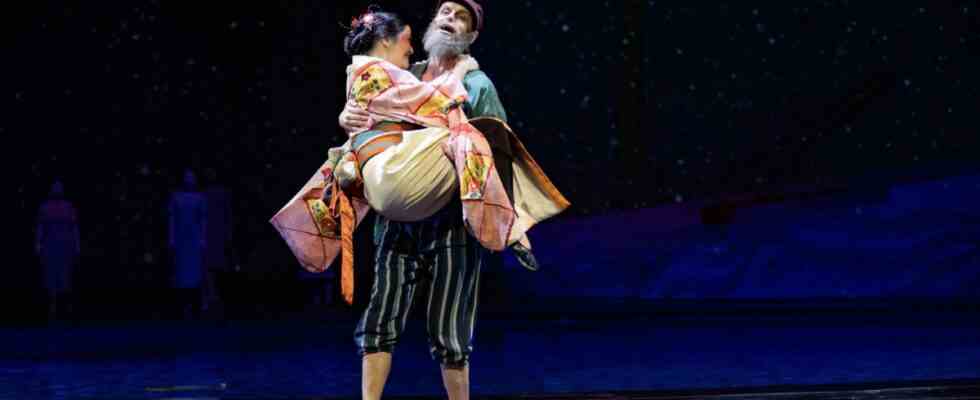It’s an enchanting idea (and annuls the strict copyright) to let children draw Hundertwasser pictures of colorful, curvy buildings and landscapes and decorate the foyers of the Festspielhaus with them. But how good is the idea of having a crowd of children in recycled gray overalls painted with squiggles by Hundertwasser on stage? Respectively by Felix Martin, who portrays the Viennese globetrotter sometimes with and sometimes without a beard as a dreamy Schmalibert, as a confused prophet in sandals, as an art teacher in colorful Mallorca pensioner clothes and spontaneous sayings with bare bottom. “My paintings are my children,” says the painter. So this mini body painting show makes perfect sense. In addition, it is artfully staged on the revolving stage of the Festspielhaus, with dancers as nymphs entertaining the guests on the artificial lake (which comes from Muse here). Together with the watercolor whirlpools projected onto the back wall (all pictures of Hundertwasser’s only daughter Heidi Trimmel) and the elves abseiling down the grid to a playful rain song, this results in a spatial and scenic depth that is rarely found in a full-format musical.
Because very few Singspiel directors really dare to do anything. With scheme F, however, one would posthumously insult the dreamer, smart guy, fantasist and de-standardizer Hundertwasser. And so theater director Benjamin Sahler and director Dirk Schattner want to celebrate “Hundertwasser – The Musical” as a brand new “happening” about a peace activist and eco-pioneer. A social-synaesthetic party performance, so to speak. The performance history does not go back to the hippie era. But until 2003, when this story about the hundred-year-old came to the stage in Uelzen, with music by Konstantin Wecker, which did not save the play from the imminent end. The librettist Rolf Rettberg never gave up. A new edition in 2013 in front of Friedensreich’s Grüner Zitadelle in Magdeburg with Sahler as director and new music by Stefan Holoubeck mixed together from Latin, rock and art song colors was thwarted by the death of a producer.
People who visit castles also go to musicals
As the resurrection helpers of the Füssen Festival Hall connected with their play “Ludwig²”, Rettberg and Sahler now caught up with the world premiere at Forggensee. Interesting from a German point of view, but not the most popular material about a kitsch artist ridiculed by purists – from the Allgäu tourist perspective it’s a coup: Hundertwasser is a world star. “Like Mozart,” says his manager “Mr. Money” in the play (Alexander Kerbst between Falco and Elvis’ Colonel Tom Parker), he can be bought on calendars and ashtrays from America to Japan. People who visit castles also go into musicals about someone who wishes “to make a Neuschwanstein out of every gas station”.
Applause from the scene for the sugar-coated Viennese urban culture: the dancing Mozart balls.
(Photo: Michael Böhmländer)
The fact that a Japanese woman is a main character does not come from the marketing department, but from Hundertwasser’s biography. He took his wife Yuko Ikewada with him all over the world. Here she is called Amenoki, “rainy day”, like his sailing ship (he loved raindrops like “kisses from heaven to earth”). All of the figures here are not precisely drawn people, but rather expressionistic allegories: scene applause for Stefanie Kock as oversaturated Viennese city culture (councillor) in the Mozartkugel ballet with golden bathing caps. The audience is just as in love with Tamara Wörner’s soul power. The same applies to the production team, which is probably why they extensively embody “Africa” here – a somewhat sweeping explanatory figure for the genesis of Hundertwasser’s longing for colour, nature and origin.
Strong voice: Tamara Wörner sings the role of Africa in the Hundertwasser musical.
(Photo: Michael Böhmländer)
Amenoki (played gracefully by the Filipina Leah Delos Santos) represents the love of a couple, which in the end peels out of the colorful kimono armor to free itself from the free spirit and its Oedipal attachment to the Mohnstrudelmama (Isabella Dartmann) to free. After a few beautifully sung duets, the spouses parted a little too late in terms of dramaturgy by mutual agreement. Hundertwasser’s longest and favorite companion is the mute muse “Kunterbunt”, who is initially stroked awake to the dance with a large brush (no sexual allusion) – as light as a feather and bold as the dancer (and dance captain) Anna Martens flows around him with a flower cap and overalls, you can understand , why.
So yes, the idea is great. An outsider who made lines and architecture dance must be celebrated in such a great musical experiment. Afterwards, you feel Hundertwasser more than you realize. That’s okay. If you want to know more about his Jewish family in Nazi Vienna, his 16-year-old first wife, his self-sufficient solar energy settlement in New Zealand, small businesses on the humus toilet on the ship or the big businesses of the Hundertwasser Foundation, read on or look Peter Schamoni’s documentary film “Regentag” and all interviews with Heidi Trimmel, who feels cheated of her inheritance. The fact that you now want detention is not a fault of the musical, but a strength.
Hundertwasser – The Musical, Festspielhaus Neuschwanstein, Füssen, next performances: Fri.-Sun., 4.-6. Nov

